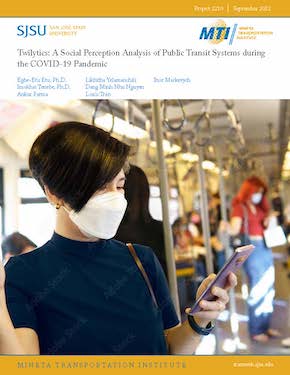- 408-924-7560
- mineta-institute@sjsu.edu
- Donate
Twilytics: A Social Perception Analysis of Public Transit Systems during the COVID-19 Pandemic
In the United States, public transit ridership in 2020 declined by 79% compared to 2019 levels. With lockdowns implemented during the early days of the pandemic, direct human-to-human interactions migrated to virtual platforms (e.g., Facebook, Twitter, and Reddit). Social media platforms have aided researchers in answering numerous questions about current societal dilemmas, including COVID-19. This study investigates the public’s perception of transit systems via a social media analysis given the emergence of vaccines and other COVID-19 preventive measures. We developed a structured transportation tweet analytics framework (Twilytics) to analyze public discourse data (i.e., tweets from 2020 to 2021) on the impact of COVID-19 on transit systems. The framework has four main components. First, we extracted tweets between June 2020 to November 2021 from carefully curated keywords addressing transit services. Second, we pre-processed the data with data cleaning and feature engineering methods. Third, we performed descriptive and statistical analysis on the cleaned data. We hypothesized that the daily and monthly tweets related to transit systems will be significantly different. Lastly, we performed topic modeling to uncover the prominent themes of the public’s perception of transit systems during the pandemic. Overall, we extracted 44,320 tweets related to public transit in the US within the study period. Our results revealed that, on average, from June 2020 to November 2021, July (103) and Tuesdays (91) had the highest transit-related tweets. Kruskal-Wallis’s analysis of variance test results showed a statistically significant difference (p < 0.05) in the number of transit-related tweets per month and day. The topic modeling findings revealed themes of fear and confusion concerning the use of public transportation during the pandemic. Second, the public had doubts regarding the vaccines’ impact on transportation and movement throughout 2021, with most users concerned about the proliferation of new variants. Lastly, Twitter users were concerned about the travel bans placed on African countries amidst the Omicron variant and urged the government to remove the bans. These findings will help bridge the gap between public health, transport, and commuter needs by helping transportation authorities and city planners better understand the social perception of transit systems during a pandemic.
EGBE-ETU ETU, PHD
Dr. Etu is an Assistant Professor of Business Analytics at San Jose State University (SJSU). He is also a Research Associate in the Mineta Transportation Institute. Before joining SJSU, Dr. Etu received his Ph.D. in Industrial and Systems Engineering from Wayne State University, Detroit in 2021 and his bachelor’s degree in Civil Engineering from Covenant University, Nigeria, in 2016. His research interest centers on the development of use-inspired machine learning models to solve challenging business problems in healthcare, manufacturing, and transportation. He is a member of the Industrial Engineering and Operations Management (IEOM), the Institute of Industrial & Systems Engineering (IISE), and SAVE International.
IMOKHAI TENEBE, PHD
Dr. Tenebe is currently a software engineer. Previously, he was a safety engineer with the Texas Commission on Environmental Quality in Austin, Texas and participated in research at Texas State University, San Marcos. He obtained his Ph.D. in Water Resources and Environmental Engineering and has two masters in the same area of expertise from Nigeria and the United States. He has published over 80 articles on several subjects with interest in water resources, healthcare, pollution, transportation, and data science. Dr. Tenebe is also a Research Associate at the Mineta Transportation Institute.
ANKUR PARMA
Ankur is a graduate student completing his M.S. in artificial intelligence at San Jose State University. He received his B.S. in Applied Petroleum Engineering from the University of Petroleum and Energy Studies, India, in 2016. His research interests lie in deep learning and reinforcement learning.
LIKHITHA YELAMANCHILI
Likhitha is a graduate student completing her M.S. in computer science at San Jose State University. She received her Bachelor of Technology in computer science from the Gayatri Vidya Parishad College of Engineering (Autonomous), India, in 2019. Her research interests include machine learning, big data, and artificial intelligence. Likhitha also enjoys developing web applications.
DANG MINH NHU NGUYEN
Nguyen is a recent graduate of San Jose State University. Nguyen received her B.S. in Applied Mathematics, with a concentration in Statistics in June 2022. Her research interests include technology, healthcare, business, finance, and aerospace.
LOUIS TRAN
Louis is an undergraduate student majoring in Applied Mathematics, with a concentration in Statistics at San Jose State University. His research interests lie in machine learning methods and applications.
IHOR MARKEVYCH
Ihor received his M.Sc. in computational data science from Carnegie Mellon University, Pittsburgh in 2021 and his bachelor’s degree at the Institute of Applied System Analysis from the National Technical University of Ukraine in 2019. His research interests include differential modeling of semi-linear parabolic systems with composition methods and convergence of iterations in the Trotter-Daletskii formula for nonlinear perturbation. He is an active member of the Association of Computing Machinery Society.
-
Contact Us
San José State University One Washington Square, San Jose, CA 95192 Phone: 408-924-7560 Email: mineta-institute@sjsu.edu






